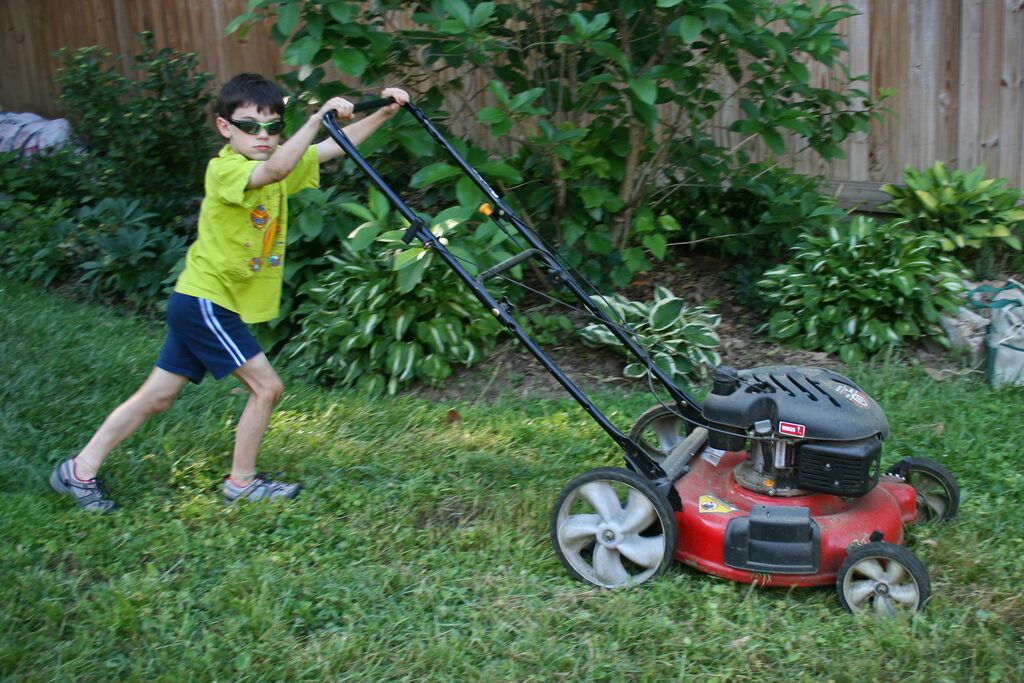
Instead of trying to be the “best,” focus on teaching your kids life skills they can use to become helpful members of the family. A big trap in modern parenting is the pressure of competition. Who can make the cutest birthday cupcakes? Which parent can get to the most soccer games?
When you’re dealing with parenting your kids and caring for an aging parent, you definitely don’t have time for this nonsense. Instead of trying to be the “best,” focus on teaching your kids life skills they can use to become helpful members of the family. Even preschoolers can do some chores if you choose age-appropriate tasks. As kids work on mastering their assigned tasks, they’ll gain valuable skills and self-confidence, and you’ll get some breathing room when the family’s work is more evenly distributed.
Birth to Age 2
OK, so there aren’t many chores an infant can do. Still, it’s never too early to get in the habit of having your child watch you do chores as you talk through the steps. Invest in a great carrier and try some babywearing while you do laundry, empty the dishwasher, or run the vacuum. Toddlers can follow you around the house to watch you work. Be sure to answer all their questions and don’t drop everything the moment they want to do something else; instead, set the stage for understanding delayed gratification and the importance of completing a task.
Preschoolers
Kids in this age group may still struggle with fine motor skills, but they can handle large objects easily. They are also learning to sort things into categories and detect patterns, so take advantage by teaching them to do the following household chores:
- Picking up toys and returning them to the right spots (Bins labeled with a photo and word are a huge help!)
- Sorting clean silverware from the dishwasher
- Separating whites and darks on laundry day
- Folding basic items, such as towels
- Matching clean socks and putting them away
- Putting away groceries in the correct locations, especially if you have clearly defined shelves in your fridge
Elementary Schoolers
Once kids get to school, they are curious about how things work, especially machines. They’re also learning to follow more complex, multi-step directions. You can break down directions into single steps with pictures for more complex chores if necessary, but most school-age children are ready for the following chores:
- Running the dishwasher (Break this down into loading and unloading for younger kids first, then let older ones use the magical buttons and settings.)
- Doing the laundry (Once your kids are old enough to reach the washer and dryer, they can quickly become independent with this chore, since most clothes these days are colorfast and preshrunk.)
- Folding and putting away the laundry (Have first graders start with folding pants in half before working up to T-shirts and sweaters.)
- Setting and clearing the table (The very youngest kids should stick to plastic plates and flatware to practice.)
- Vacuuming the rugs (Younger kids can start small with a DustBuster.)
- Making the bed (You may need to help with fitted sheets.)
Tweens and Teens
By the time your kids reach middle and high school, they’re ready to take on just about anything that needs to be done around the house if you’ve taught them well along the way. Allowing older kids choices by letting them do the chores they like (or at least the ones they don’t hate) can help defuse angst-driven rebellion issues, and you can always tie the chores to an allowance as a reward. Many teens thrive when given room to show responsibility and creativity. Here are some ideas:
- Packing lunches and cooking simple dinners
- Babysitting younger siblings
- Keeping grandparents company
- Mowing the lawn
- Cleaning the house (or a particular room)
- Running errands within walking or biking distance
Raising kids to be responsible, competent members of the family isn’t just about getting some help around the house. Giving them responsibility teaches them the importance of a family working together and shows them that everyone has something to contribute. The result will be a fully functional family that works together — leaving more time to play together.
Source List:
- http://www.becomingmamas.com/babywearing/
- http://www.designastudy.com/teaching/tips-1000.html
- http://everydaylife.globalpost.com/multistep-direction-activities-kids-14323.html
- http://www.webmd.com/parenting/features/chores-for-children?page=2